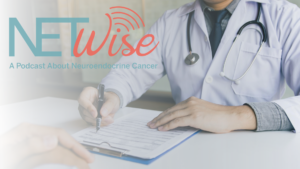Clinical Trials for Neuroendocrine Tumors
Home » For Patients old » NET Tests & Treatments » NET Treatments » Clinical Trials
How do you find clinical trials for neuroendocrine tumors?
Clinical trials test the safety and effectiveness of new therapies for neuroendocrine tumors (NETs). The treatment tested in a clinical trial may not yet be widely available. Participating in a clinical trial can give patients early access to the latest treatment options. It also helps improve care for other patients and families facing NETs.
What is a clinical trial?
Clinical trials are the final step in a long process that begins with research in a lab. Before any new treatment is used with people in clinical trials, researchers work for many years to understand its effects on cancer cells in the lab and in animals. They also try to figure out the best does for a treatment, the side effects it may cause, and how its effectiveness compares to other current treatments.
Phases of a clinical trial
Clinical trials occur in phases. If a new treatment is successful in one phase, it will proceed to further testing in the next phase.25
Phase 1 purpose
- To find a safe dose.
- To decide how the new treatment should be given (by mouth, in a vein, etc.).
- To see how the new treatment affects the human body and fights cancer.
- Number of people taking part: 15–30.
Phase 2 purpose:
- To determine if the new treatment has an effect on a certain cancer.
- To see how the new treatment affects the body and fights cancer.
- Number of people taking part: Less than 100.
Phase 3 purpose:
- To compare the new treatment (or new use of a treatment) with the current standard treatment.
- Number of people taking part: From 100 to several thousand.
How to find a clinical trial

First talk to your doctor about your interest in clinical trials. Studies have strict criteria about who can and can’t participate. Your doctor will be a good resource to help you determine what makes sense for you.
Questions to ask your doctor about clinical trials
If you are thinking about taking part in a clinical trial, be sure to ask your doctor, “Is there a clinical trial that I can join?” If your doctor offers you a trial, here are some questions you may want to ask.
Questions about the trial
- What is the purpose of the trial?
- Why do the researchers believe that the treatment being studied may be better than the one being used now? Why may it not be better?
- How long will I be in the trial?
- What kinds of tests and treatments are involved?
- How will the doctor know if the treatment is working?
- How will I be told about the trial’s results?
- How long do I have to make up my mind about joining this trial?
- Who can I speak with about questions I have during and after the trial?
- Who will be in charge of my care?
- Is there someone I can talk to who has been in the trial?
Questions about risks and benefits
- What are the possible side effects or risks of the new treatment?
- What are the possible benefits?
- How do the possible risks and benefits of this trial compare to those of the standard treatment?
Questions about your rights
- How will my health information be kept private?
What happens if I decide to leave the trial?
Questions about costs
- Will I have to pay for any of the treatments or tests?
- What costs will my health insurance cover?
- Who pays if I’m injured in the trial?
- Who can help answer any questions from my insurance company?
Questions about daily life
- How could the trial affect my daily life?
- How often will I have to come to the hospital or clinic?
- Will I have to stay in the hospital during the clinical trial?
- If so, how often and for how long?
- Will I have to travel long distances?
- Will I have check-ups after the trial?
Questions about comparing choices
- What are my other treatment choices, including standard treatments?
- How does the treatment I would receive in this trial compare with the other treatment choices?
- What will happen to my cancer without treatment?
Learn more about clinical trials
It might help to learn more about clinical trials. It may make it easier for you to talk to your doctor about possible studies. And it can help you know what questions you want to ask.
Listen to NETRF’s
NETWise podcast on Clinical Trials.
Also, take a look at these resources:
Basic information on clinical trials:
Introduction to cancer research for patients:
Search for clinical trials:

Pam Kunz, MD, Stanford Cancer Center
Recent Advances and Ongoing NET Clinical Trials Watch Video
Nitya Raj, MD, Memorial Sloan Kettering Cancer Center
Understanding Clinical Trials Watch Video
Nagla Karim, MD, PhD, University of Cincinnati
The SPINET trial for Lung NET Watch Video
Renuka Iyer, MD, Roswell Park Cancer Center
Understanding Clinical Trials Watch VideoSearch for NET specialists
Find NET doctors, treatment programs, and support groups near you
25 National Cancer Institute. Phases of clinical trials.. https://www.cancer.gov/types/gi-carcinoid-tumors/hp/gi-carcinoid-treatment-pdq#cit/section_4.1 Accessed December 21, 2018.


